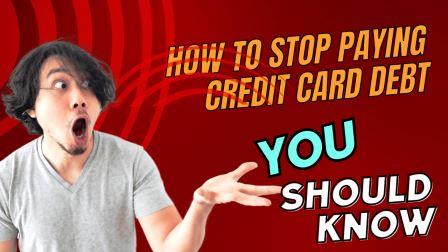Credit card debt can feel like a heavy burden, causing stress and anxiety. But fear not! In this comprehensive 2000-word blog post, we’ll explore practical strategies to break free from credit card debt and regain control of your financial life. Whether you’re a seasoned budget ninja or a debt newbie, these actionable tips will empower you to stop paying credit card debt and start living worry-free.
1. Choose Your Payoff Method
When it comes to tackling credit card debt, having a clear strategy is essential. Consider two popular approaches:
a. The Snowball Method
- Advantages:
- Quick wins: Pay off smaller balances first.
- Psychological motivation: Celebrate each victory.
- Disadvantages:
- May not save as much on interest.
b. The Avalanche Method
- Advantages:
- Focuses on high-interest debt: Save money by targeting the most expensive balances.
- Mathematically efficient.
- Disadvantages:
- May take longer to see progress.
Tip: Combine elements of both methods for a customized approach that aligns with your personality and financial goals.
2. Boost Your Income
- Get Another Job:
- Consider part-time work or freelancing.
- Use the extra income solely for debt repayment.
3. Create a Written Plan
- Set Clear Goals:
- Define your debt-free date.
- Break down the total amount into manageable chunks.
4. Control Your Spending
- Assess Your Habits:
- Identify areas where you can cut back.
- Try a “no spend” month to reset your spending patterns.
5. Prevent Accumulating More Debt
- Avoid New Charges:
- Put your credit cards on ice (literally, if needed).
- Allocate funds strictly for necessities and debt repayment.
What Happens If You Stop Paying Credit Card Debt?
- Late Payments:
- Late fees and interest accrue.
- Your credit score takes a hit.
- Ignoring Debt:
- Collection agencies may get involved.
- Legal action could follow.
Debt Settlement as an Option
- Risk vs. Benefit:
- Debt settlement can reduce your debt load.
- Weigh the risks and potential benefits.
Conclusion
By following these steps, you can stop paying credit card debt and regain financial peace. Remember, you’re not alone—many have conquered debt, and so can you! Take charge, make a plan, and celebrate each step toward a debt-free future. 🌟
Frequently Asked Questions
What happens when you quit making credit card payments?
- When you stop making credit card payments, several consequences can occur:
- Late Fees and Interest Accumulation: Credit card companies will charge late fees, and interest will continue to accrue on your outstanding balance.
- Credit Score Impact: Your credit score will take a hit, affecting your ability to borrow in the future.
- Collection Agencies: If you consistently miss payments, collection agencies may get involved.
- Legal Action: In extreme cases, creditors may take legal action to recover the debt.
What should you do if you are late on making credit card payments?
- If you’re late on credit card payments, take these steps:
- Contact Your Credit Card Issuer: Explain your situation and ask for a grace period or a payment plan.
- Prioritize Payments: Allocate funds to pay at least the minimum due on time.
- Avoid Further Late Payments: Prevent additional late fees by making timely payments moving forward.
Can I just ignore my credit card debt?
- Ignoring credit card debt is not advisable. It won’t make the debt disappear; instead, it will worsen the situation.
- Address the debt proactively by communicating with your creditors and exploring repayment options.
What’s the worst that can happen if you stop paying a credit card?
- The worst-case scenario includes:
- Legal Action: Creditors may sue you to collect the debt.
- Judgments and Wage Garnishment: If they win the lawsuit, they can obtain a judgment and garnish your wages.
- Credit Damage: Your credit score will suffer significantly.
What protections do I have if I stop paying credit card debt?
- While there’s no complete protection, you can:
- Negotiate with Creditors: Work out a repayment plan or settlement.
- Seek Legal Advice: Consult an attorney to understand your rights and options.
